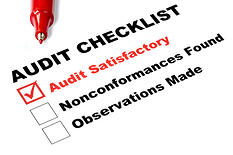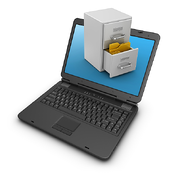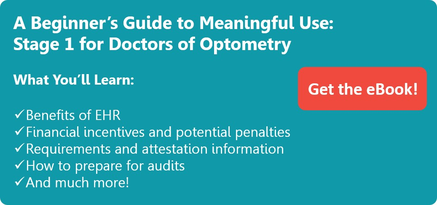Audits: Meeting Meaningful Use Criteria for Optometrists
Meeting all of the meaningful use criteria can be tedious, time-consuming, confusing, and can even be stressful if you’re worried about being audited. And just when you thought you were off the radar, you receive a letter notifying your practice of an audit. Audits are conducted to make sure practices have met all the requirements of the meaningful use program, and are operating in an efficient and correct manner to assist patients. We've come up with a list of tips to help you take the right steps in the event your practice gets audited.
1. What Can Trigger Audits?
There are two types of audits; pre and post payment audits. Pre-payment audits have only recently become available, and are done before payments have been received. Post-payment audits occur only after a payment has been made, and may include repayments towards the government.
If your practice has been notified for an audit, don’t get your stomach in a knot. Many audits are done simply by protocol and are triggered automatically; and not from your practice’s errors or miscoding. The Center for Medicare and Medicaid Services (CMS) audits between 5-10% of the documents they receive. Plus, most auditors have limited knowledge in the eyecare industry so there’s no need to worry as long as you’ve complied with procedures. And if you truly feel they’ve made a mistake on their part, you can challenge it!
However, many optometrists can't defend themselves because they're not aware of the rules, or don't understand how to use codes in a certain way. Auditors look out for practices that intentionally transcribe lower and use less complicated codes. For example, using 92000 instead of 99000 codes, simply because they don’t know exactly how to use higher codes.
2. How You Can Prepare
So now that you’ve received your audit notice, first thing is to get your paper work sorted. The audit letter will clearly state the list of documentations requested such as, proof of certified EHR, completed attestation application via screenshots, records from EHR vendors, and CQM reports. After submission, they might request more documentation for additional clarification. Here are some ways to prepare for an audit:
- Record Everything! As you can tell, the audit process requires a lot of records and documentation. Make sure you can support your attestation by keeping all of your documents up to 6 years after attestation.
- Be Aware of Deadlines. Don’t delay compliance, but request an extension if more time is needed. You don’t want to end up paying a fine because you rushed through the submission process, resulting in inaccurate reports.
- Have a Facilitator. Have someone in the office keep in contact with the auditor so you’re clear of expectations. Your EHR vendor can also provide support.
- Withdraw Attestation. If you’ve received an audit and realized that you have indeed entered in wrong information, you can withdraw your attestation and attest again.
- Do NOT Alter Any Records! Whatever you do, do NOT alter any records you send in.
Remember you don’t have to deal with the audits alone. Make sure you read the contract and understand your rights. You can also ask colleagues in the industry if they’ve been through an audit by the same auditor. And you can always seek legal advice, and extra assistance from your state associations.
3. Best Practices
If you’ve never received an audit, you’re not out of the clear just yet for Stage 2. Your eyecare practice should still be prepared and have best practices in place.
If your practice has already gone through an audit, there is a higher chance of being audited in the next stage. It also increases the chance of other ODs who work in the same practice of being audited, so make sure to notify your practice if you are being audited. In addition to notifying your colleagues, other best practices to implement include:

- Conducting an in-office audit every 6-12 months
- Making sure each physician’s charts are up-to-date with correct record keeping
- Finding out if accurate choices of codes were used
- Taking the time to go through patient records
- Making sure reasons for patient visits are accurately stated on file
4. Have the Right EHR System
A certified EHR is required to participate in meaningful use, so be sure to find the right EHR system that’s most efficient for your practice. According to the latest market research from NCHS, almost 90% of physicians have adopted an EHR, or are in the process of doing so. But make sure to watch out for EHR solutions that are based on older technologies. This will require a lot of experience in order to process a function, and will slow down your practice. It’s important to understand every feature of your EHR, especially the ones that will help you meet the requirements of meaningful use criteria.

EHR systems should make recording data a simple task in the office. Some solutions have templates to guide you through the examination and documentation. EHRs should also populate codes simply by using the content of your records. These are just some benefits of having the right EHR system for your practice. To learn more about your decision of selecting a vendor, check out the 4 Superstar Qualities Your EHR Software Should Have.
So if you do get notified of an audit, it will be an easy process as long as you’ve recorded your attestations correctly while implementing best practices in the office. Your audit process should be a simple submission of the right records they’ve requested.
If you want complete information on how meaningful use can help your practice during auditing, our eBook: ‘A Beginner’s Guide to Meaningful Use’ will help you learn everything you need to know to get started!


